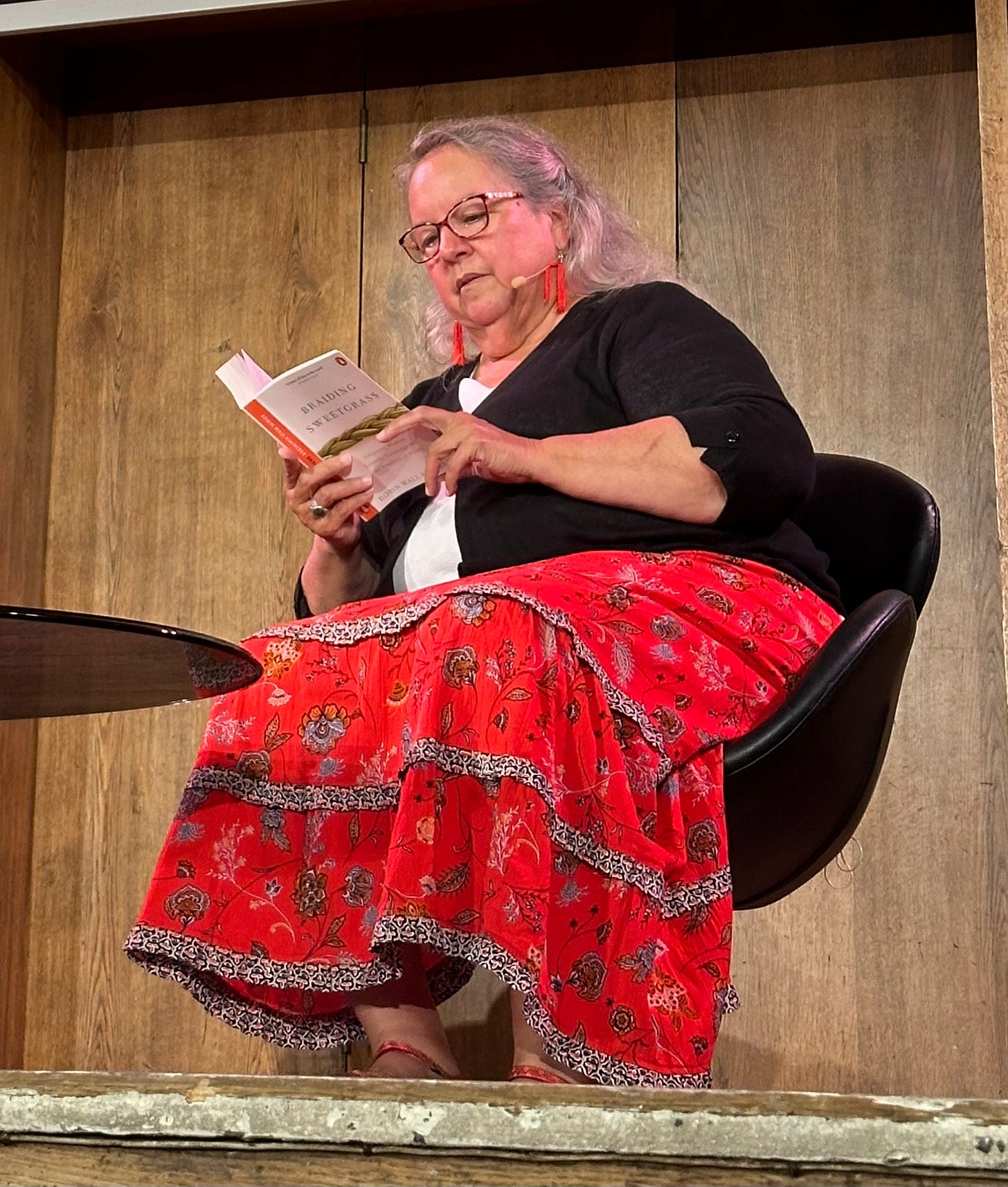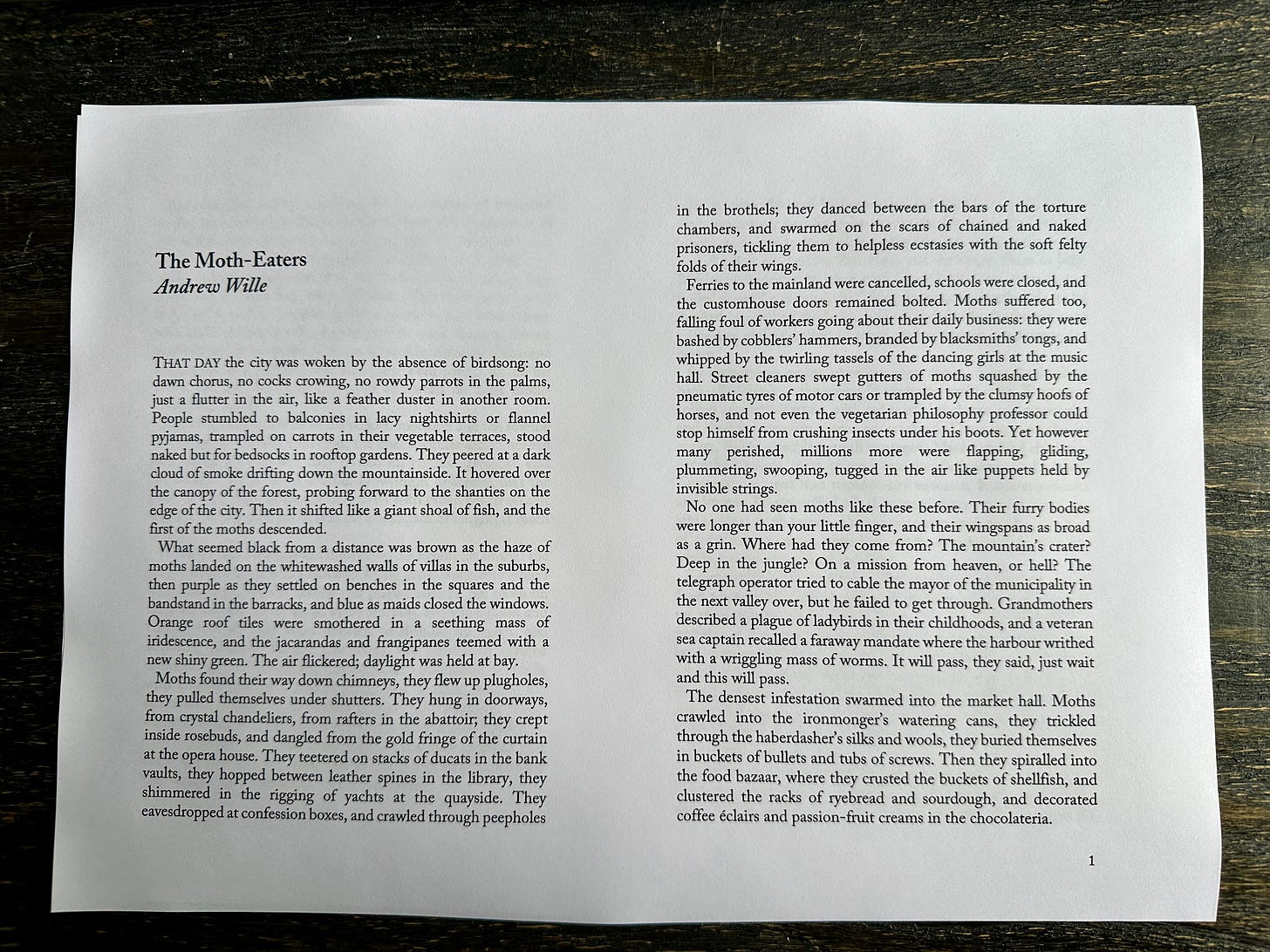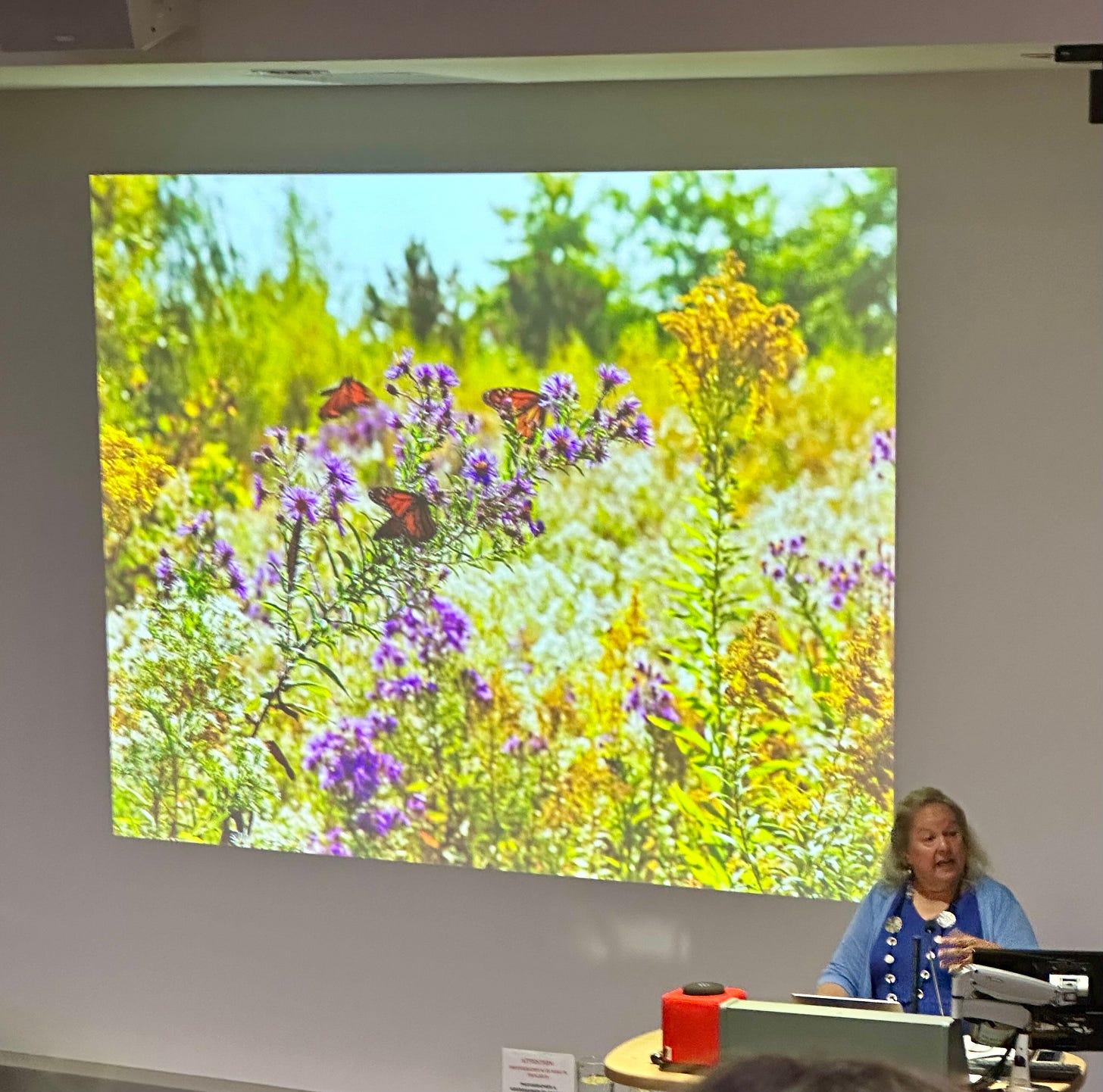The Giving of Writing
Robin Wall Kimmerer, and the gifts on every page of our writing
Above: Robin Wall Kimmerer reading from Braiding Sweetgrass at Conway Hall on 30 May 2024.
I was very lucky this week to attend not one but two events with Robin Wall Kimmerer, the author of Braiding Sweetgrass, my favourite book of - ooo, the last ten years, or should I say this century, or maybe forever. If you’ve not read it, the subtitle Indigenous Wisdom, Scientific Knowledge and the Teachings of Plants offers an explanation.
It felt special to be there at beloved Kew Gardens during Robin’s first ever visit, and it was quite something to see a lecture hall packed with scientists spellbound as she talked about paying attention to plants as our oldest teachers. It was so good I booked to see her again on Thursday, this time in thoughtful and engaged conversation with Alice Vincent at Conway Hall in Red Lion Square. I even had a front row seat. I really did sit at the feet of someone I regard as a living saint.
Robin Wall Kimmerer is one of those truly great communicators. Her writing possesses a particular tone that makes her present on the page, and then her audiobook narration brings a further warmth and humour. In person, she was everything her adoring audience wanted and more, not only expanding on ideas such as the language we use to talk about the natural world, but also offering imaginative and heartfelt answers that connected with everyone in the room. This is a rare gift.
The idea of giving was in fact one of the most important messages on both nights. It chimes with the message of reciprocity at the heart of Braiding Sweetgrass - the idea of creating a sharing economy of gifts and abundance.
Giving came up in answers to questions that rose from a certain sense of helplessness expressed by many: what can we do when there is so much despair and conflict in the world - ecological crisis, war, the relentless take take take of extractive economics and colonial systems?
I was particularly interested to hear Robin (and Alice) question the idea of hope. ‘I don’t really get hope,’ said Robin.
I’ve had my own brush with hope in recent years, and it didn’t end up how I wanted, and it’s left me questioning the place of hope at difficult times. I mean, it can be inert and pretty hopeless, you know?! Certain types of suffering have to be accepted, and then we have to do the best that we can do in the circumstances - and that means facing the suffering and doing something about it, rather than blindly hoping, doesn’t it?
That doing often involves simple acts of compassion. Sometimes just being a loving presence is enough.
And then Robin asked: What do you have to give? It was heartening to hear what can be given by all the scientists and teachers and psychologists and architects and the poets and the storytellers both nights this week. And there were so many young people in attendance, which felt hopeful, even for those of us who don’t always get hope.
In another life, perhaps I’d have been a botanist or a soil scientist, but for now I edit and teach and work in the world of writing. So how is our engagement with writing giving something back? How is it an act of love in service to the earth, and to others?
The gift of writing can take many forms - entertaining, informing, illuminating, helping, serving some greater purpose. Engaging with that idea of the gift in our work can be an important task.
This recalled an experiment I frequently suggest to writers I work with, particularly at stages of revision and redrafting: A Gift On Every Page.
I suggest that you trick yourself into seeing your book as, um, a book by printing it with a book layout, i.e., single-spaced and justified in two columns landscape, using an elegant bookish font such as 11pt Baskerville or Garamond, and not forgetting to paginate. See example below using 11.5pt Adobe Caslon.
Then you read the book without making any edits on the hard copy - you simply write at the top of every page (or column) what you are giving to the reader at this point: a piece of action, an insight into character or an imaginative detail of setting, a lively exchange of dialogue, an emotional charge, a shift of some sort, or a disruption in energy. A bit of lyricism - a shaft of clarity.
This can be a valuable way of creating an inventory of your work-in-progress and its patterns and pacing. Perhaps tabulate in a list in a notebook - page numbers in the margin, the gift beside. Some people like Excel spreadsheets, or colour-coded Post-its.
Too much in creative writing can, e.g., apply cookie-cutter formulas in looking for conflicts, and isn’t there enough conflict in the world already?! This experiment lets writers take stock more intuitively of what they have - and what they have to give, and perhaps where they might have different things to give in a future draft. It’s a good exercise in interrogating intention.
So much in the world of writing and publishing has become about take take take. I observe too much disappointment when an attachment to publishing takes over from the pleasure in writing, with too much investment in things that can't be predicted: the grasping after deals and reviews and sales and likes on social media. The hustle, the market, the burnout, the blame, the sense of rejection. All those ghosting - and now ghosted! - agents. It’s not very nourishing. Useful guides can help put things in perspective, but publishing often feels like an extractive industry.
Rather than grasping or hoping, let's think about things we can control - things we can give. I was particularly touched on Thursday by Robin Wall Kimmerer’s suggestion that we work individually and locally by giving something back through gifts of the things that we love, and the things that we’re good at. I think again about all those scientists and gardeners and activists in the audiences this week.
Beyond ourselves, sharing the words of others is a great gift for writers and readers. Many people in this week’s audiences had given Braiding Sweetgrass as gifts to others. It’s one of those genuine word-of-mouth publishing successes, handed on with enthusiasm and love. You must read this! Written with love, read with love.
And simply reading the writing of someone else is a gift of our time. Thank you for giving me your time in reading this post! Because: manners, and reciprocity.
Finally, one question on Thursday came from a mother asking how to raise children when we’re surrounded by so many pressures to take take take. The bio on page one of Braiding Sweetgrass reads ‘Robin Wall Kimmerer is a mother, scientist, decorated professor, and enrolled member of the Citizen Potawatomi Nation’, and Robin said that the role of mother is the one that comes first for her, and now she is a grandmother it’s followed by the role of grandmother. I loved her answer that acts of love can be acts of resistance.
Whether or not we have children, whatever our gender, I felt here an invitation to be, or perhaps be like, mothers and grandmothers - great givers of the world. There are other types of givers, but let’s sit with this one for now, or maybe think of roles where we are givers.
Give give give!
***
Before I go, and because I have some hustle left in me, as well as something to give, and I do love a good paradox: my next online masterclass on 10 June is on Form and Structure. I’ll talk about writing as a gift - there might be no better way of structuring a longer piece of writing than thinking about the gift it gives on every page.
And here’s some more on Robin Wall Kimmerer, including various interviews where you can watch or listen for yourself.
And below is an example of a sample of writing in 11.5pt Adobe Caslon Pro, formatted as landscape in two columns of justified text.
And below that is Robin Wall Kimmerer at Kew on Wednesday. I particularly love that picture of her with asters and goldenrods, which grow better when grown together because reciprocity and cooperation lead to better lives - see the first section of Braiding Sweetgrass.






And as a sidenote, and not at all unrelated: just before Wednesday’s event I was given a couple of gifts - objects, material items - and they were unexpected and felt like real treasures. In fact, they are real treasures! Thank you again to the giver of gifts. Receiving gifts can be a lovely thing, as well as giving them.
Thank you for this text on Robin Wall Kimmerer. It was a pleasure to read - a real treat and lots of food for thought. I was very lucky to listen to her on the Wednesday and the Thursday's interview sounded very interesting.